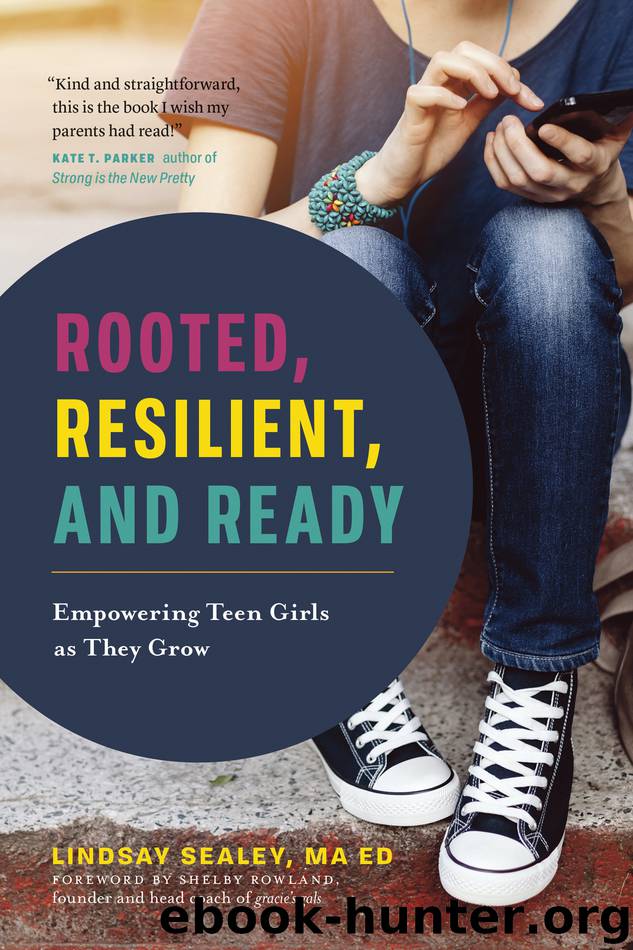Rooted, Resilient, and Ready by Lindsay Sealey

Author:Lindsay Sealey
Language: eng
Format: epub
Publisher: LifeTree Media
Published: 2019-05-28T16:00:00+00:00
Why Girls Need Connection
Prehistorically, social connections increased survival rates for humans. We are literally stronger and better together as we work to avoid conflict and fight danger. As a result, the human brain is extremely evolved for emotional connection and relationship. From a scientific perspective, connection contributes to emotional, physical, mental, psychological, and spiritual growth and health. Physical and emotional closeness connects us. Feeling connected causes the brain to release “feel good” hormones such as endorphins, serotonin, dopamine, and oxytocin. Connection feels good. At the same time, it lowers the brain’s stress response system while soothing the parasympathetic nervous system. This is conducive to self-regulation and feeling calm and confident. Secure relationships, therefore, offer feelings of warmth, belonging, safety, and love.1
With close friends, girls feel they can be themselves—unguarded and unpretentious. These friendships provide a place where girls can say anything, where they can express their deepest feelings, secrets, and insecurities and still feel seen, heard, valued, validated, and encouraged. In this safe circle, where the air is rare, there are shared interests and hobbies, values and beliefs, and experiences. There is security, familiarity, and closeness. Girls long for inclusion, and they need it to relieve their stress and lower cortisol levels.
At the same time, this quest for closeness can also cause them the most distress, especially when connection goes awry. Sometimes teen girls have a toxicity tolerance that makes it impossible for them to see or feel true, authentic, reciprocal relationships. This means that girls will endure unhealthy relationships for far longer than they need to because they either don’t know better or don’t yet know they are worth more. Often, these kinds of relationships are based on the adage “someone is better than no one.” Toxicity in friendships is not always immediately obvious; it can happen incrementally over time and often so subtly that a teen girl will not recognize it.
JORJA
Download
This site does not store any files on its server. We only index and link to content provided by other sites. Please contact the content providers to delete copyright contents if any and email us, we'll remove relevant links or contents immediately.
The Art of Coaching Workbook by Elena Aguilar(48065)
Trainspotting by Irvine Welsh(20055)
Twilight of the Idols With the Antichrist and Ecce Homo by Friedrich Nietzsche(17706)
Fangirl by Rainbow Rowell(7834)
Periodization Training for Sports by Tudor Bompa(7328)
Change Your Questions, Change Your Life by Marilee Adams(6641)
This Is How You Lose Her by Junot Diaz(5773)
Grit by Angela Duckworth(4737)
Red Sparrow by Jason Matthews(4666)
Asking the Right Questions: A Guide to Critical Thinking by M. Neil Browne & Stuart M. Keeley(4576)
Paper Towns by Green John(4169)
Room 212 by Kate Stewart(4107)
Ken Follett - World without end by Ken Follett(3972)
The Sports Rules Book by Human Kinetics(3588)
Housekeeping by Marilynne Robinson(3401)
The Motorcycle Diaries by Ernesto Che Guevara(3332)
Introduction to Kinesiology by Shirl J. Hoffman(3301)
Exercise Technique Manual for Resistance Training by National Strength & Conditioning Association(3292)
Double Down (Diary of a Wimpy Kid Book 11) by Jeff Kinney(3272)
